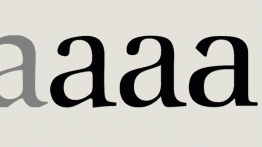Comenius, Marconi & Zapf Book: three typefaces from 1976
Tuesday, March 18, 2014, 6:30 - 8:30pm

In 1976 the International Typeface Corporation celebrated their announcement of a new typeface designed by Hermann Zapf in a folding specimen, claiming it was his first type since he “put the finishing touch“ to Optima Medium Italic “some ten years ago.” A headline revealed: “Now he’s back with an almighty Zapf!” Besides the much marketed ITC Zapf Book, two other lesser-known typefaces by Zapf were also released that year: Berthold Comenius and Marconi for Hell Digiset. This lecture focuses on all three textfaces by taking a close look at their origin, by comparing them with their contemporaries and by paying attention to their letter shapes and characteristics based on the different technological circumstances in an era on the verge from photo to digital.
The lecture is free and open to all but registration is required.
 Ferdinand Ulrich is a typographer and type historian. He is the assistant of Erik Spiekermann in Berlin, where he has been setting up an archive, designs books and spends time experimenting in the letterpress workshop. He is also an adjunct instructor at Burg Giebichenstein University of Art and Design in Halle/Saale (Germany). As a visiting scholar at Carnegie Mellon University in Pittsburgh/PA he began his research thesis on the typeface Hunt Roman which earned him a graduate degree at Berlin University of the Arts in 2012.
Ferdinand Ulrich is a typographer and type historian. He is the assistant of Erik Spiekermann in Berlin, where he has been setting up an archive, designs books and spends time experimenting in the letterpress workshop. He is also an adjunct instructor at Burg Giebichenstein University of Art and Design in Halle/Saale (Germany). As a visiting scholar at Carnegie Mellon University in Pittsburgh/PA he began his research thesis on the typeface Hunt Roman which earned him a graduate degree at Berlin University of the Arts in 2012.
Located in the Frederick P. Rose Auditorium, at 41 Cooper Square (on Third Avenue between 6th and 7th Streets)




